Foreign Policy Analysis: history, identity and foreign policy

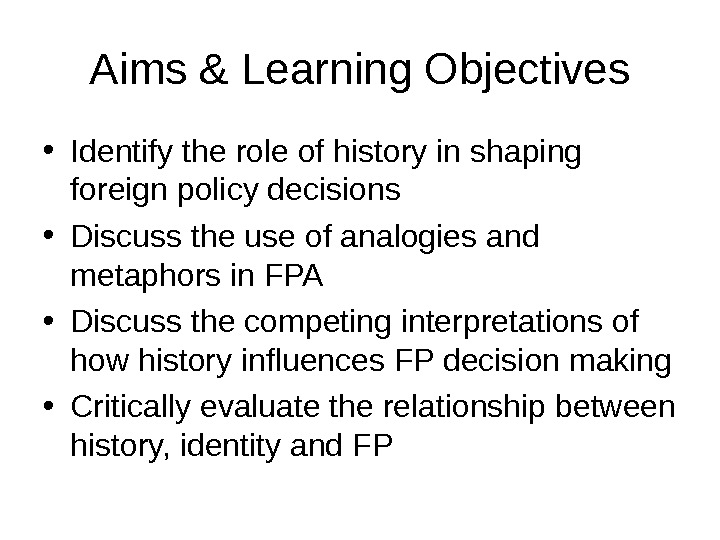
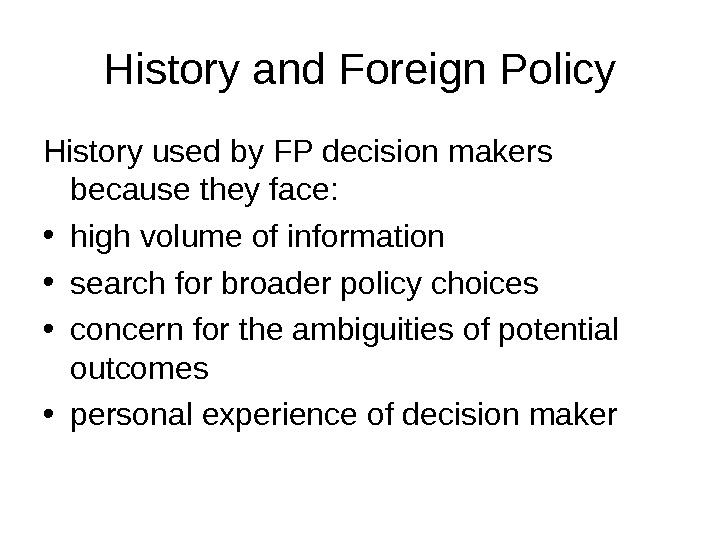

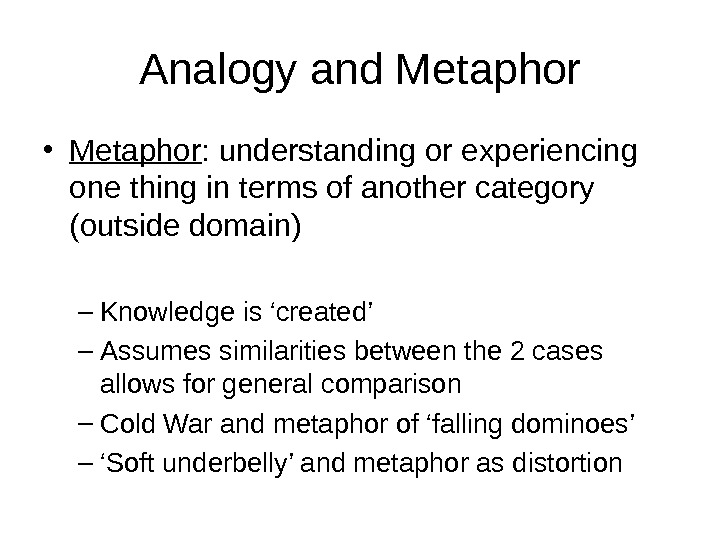

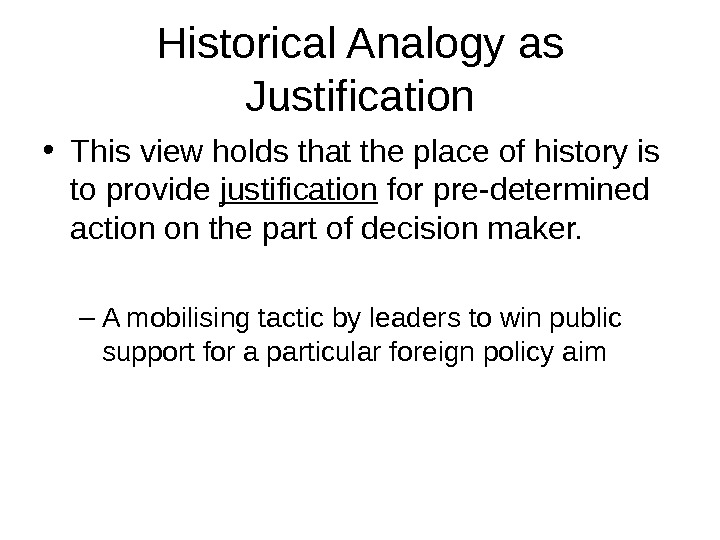
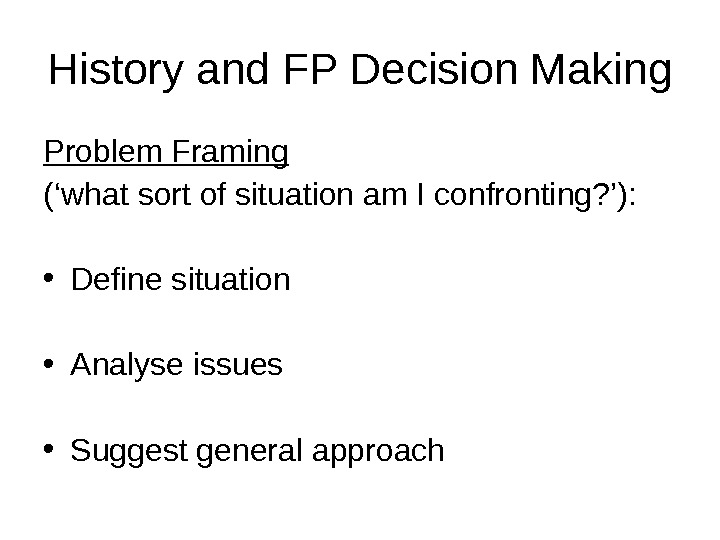






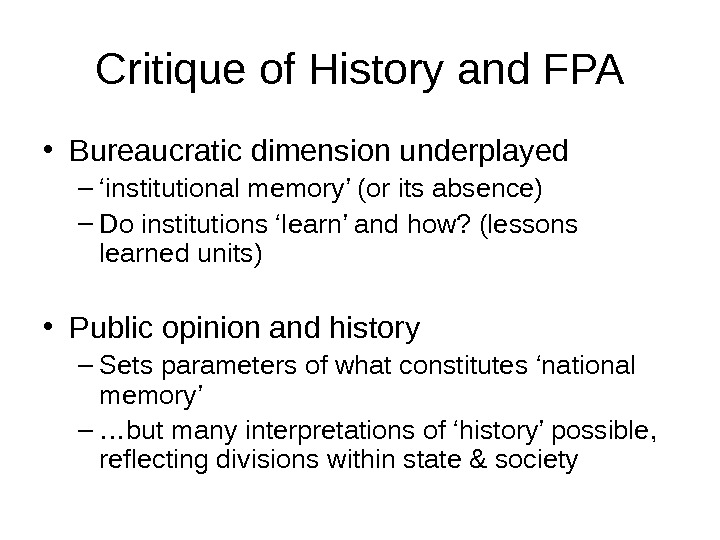



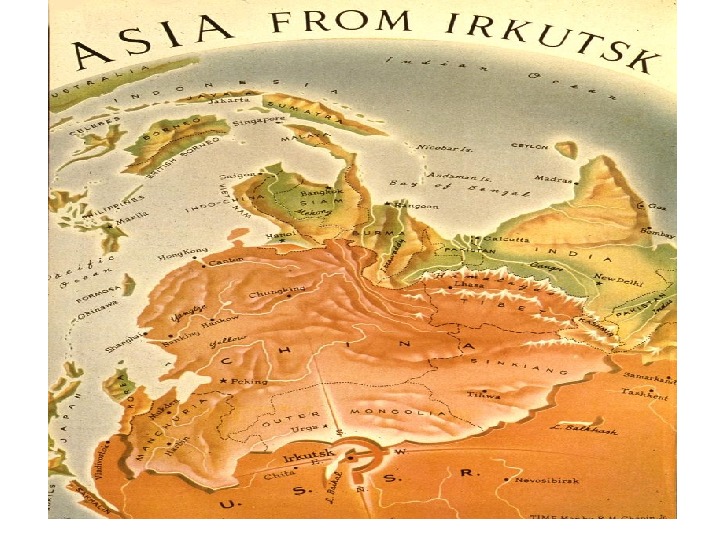
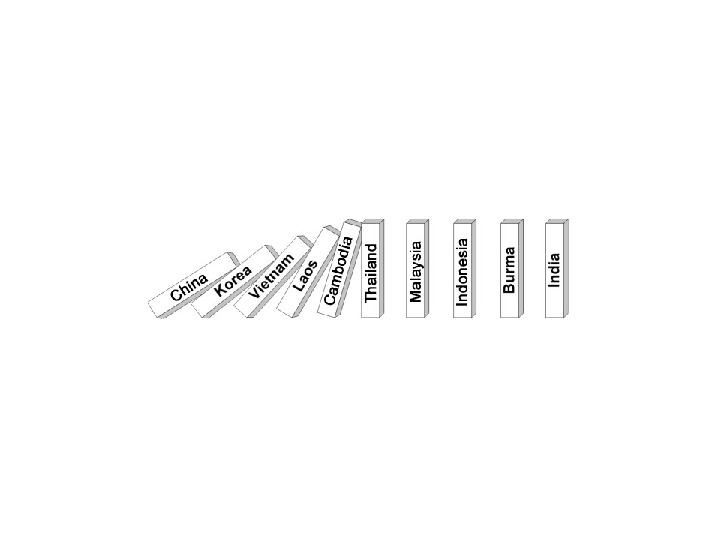
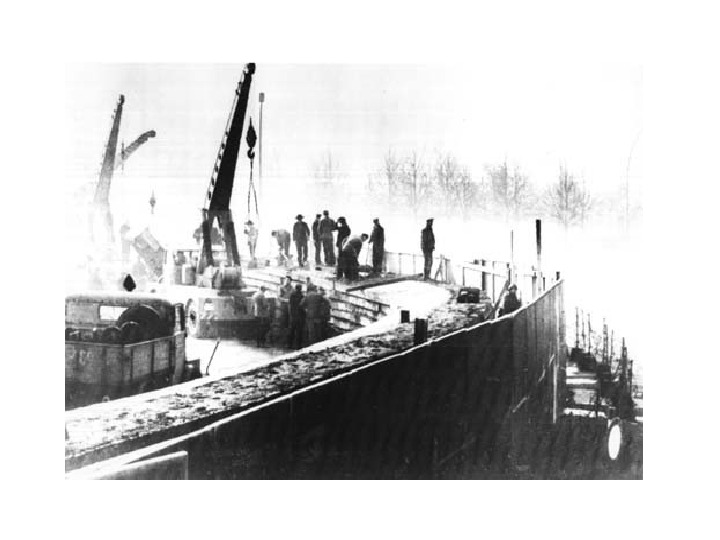
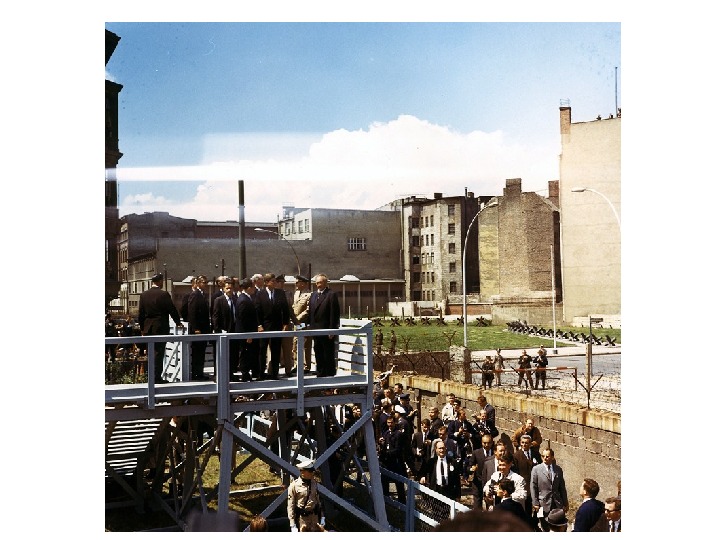







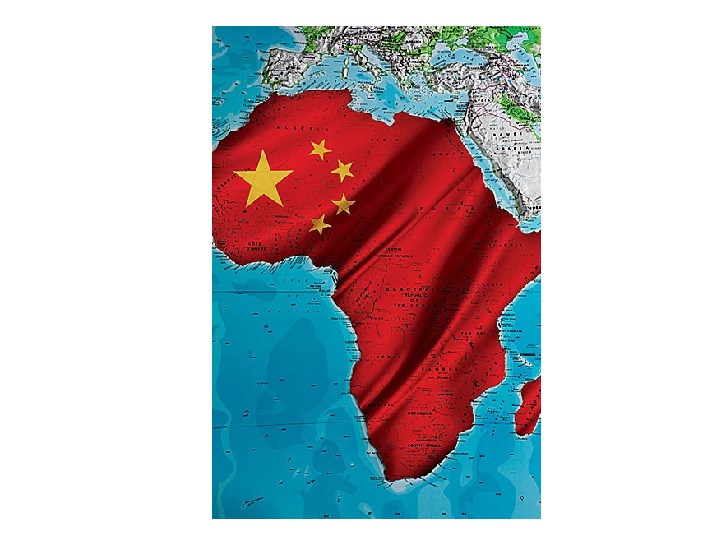
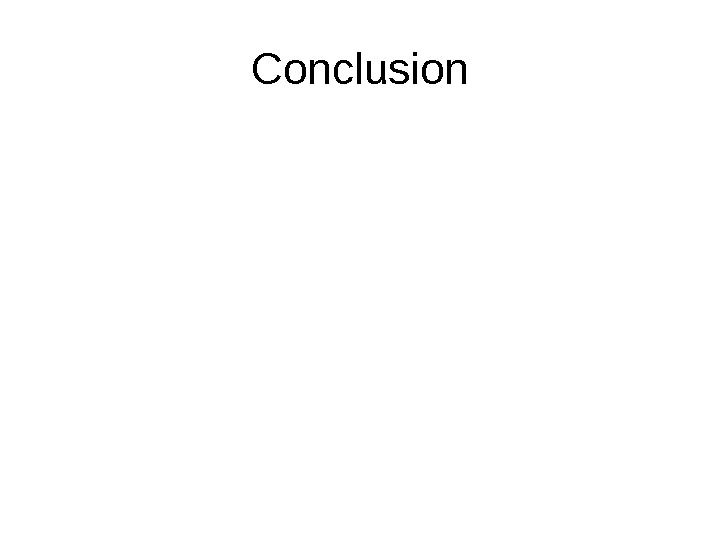
foreign_policy_analysis_5.ppt
- Размер: 2 Mегабайта
- Количество слайдов: 31
Описание презентации Foreign Policy Analysis: history, identity and foreign policy по слайдам
 Foreign Policy Analysis: history, identity and foreign policy Dr Chris Alden LS
Foreign Policy Analysis: history, identity and foreign policy Dr Chris Alden LS
 Aims & Learning Objectives • Identify the role of history in shaping foreign policy decisions • Discuss the use of analogies and metaphors in FPA • Discuss the competing interpretations of how history influences FP decision making • Critically evaluate the relationship between history, identity and FP
Aims & Learning Objectives • Identify the role of history in shaping foreign policy decisions • Discuss the use of analogies and metaphors in FPA • Discuss the competing interpretations of how history influences FP decision making • Critically evaluate the relationship between history, identity and FP
 History and Foreign Policy History used by FP decision makers because they face: • high volume of information • search for broader policy choices • concern for the ambiguities of potential outcomes • personal experience of decision maker
History and Foreign Policy History used by FP decision makers because they face: • high volume of information • search for broader policy choices • concern for the ambiguities of potential outcomes • personal experience of decision maker
 Analogy and Metaphor Analogies & metaphors key means of relating history and foreign policy • Analogy : comparisons drawn from same realm of experience (within domain) – Knowledge is ‘retrieved’ – Assumes ‘Lessons of History’ are self-evident and knowable – Cold War and Munich analogy
Analogy and Metaphor Analogies & metaphors key means of relating history and foreign policy • Analogy : comparisons drawn from same realm of experience (within domain) – Knowledge is ‘retrieved’ – Assumes ‘Lessons of History’ are self-evident and knowable – Cold War and Munich analogy
 Analogy and Metaphor • Metaphor : understanding or experiencing one thing in terms of another category (outside domain) – Knowledge is ‘created’ – Assumes similarities between the 2 cases allows for general comparison – Cold War and metaphor of ‘falling dominoes’ – ‘ Soft underbelly’ and metaphor as distortion
Analogy and Metaphor • Metaphor : understanding or experiencing one thing in terms of another category (outside domain) – Knowledge is ‘created’ – Assumes similarities between the 2 cases allows for general comparison – Cold War and metaphor of ‘falling dominoes’ – ‘ Soft underbelly’ and metaphor as distortion
 Historical Analogy as Tool • This view holds that the place of history is to help decision makers process and interpret material – Livy on Rome: ‘We can endure neither our vices nor our remedies for them. ’ – Machiavelli followed Caligula’s advice: ‘Let them hate us as long as they fear us. ’
Historical Analogy as Tool • This view holds that the place of history is to help decision makers process and interpret material – Livy on Rome: ‘We can endure neither our vices nor our remedies for them. ’ – Machiavelli followed Caligula’s advice: ‘Let them hate us as long as they fear us. ’
 Historical Analogy as Justification • This view holds that the place of history is to provide justification for pre-determined action on the part of decision maker. – A mobilising tactic by leaders to win public support for a particular foreign policy aim
Historical Analogy as Justification • This view holds that the place of history is to provide justification for pre-determined action on the part of decision maker. – A mobilising tactic by leaders to win public support for a particular foreign policy aim
 History and FP Decision Making Problem Framing (‘what sort of situation am I confronting? ’): • Define situation • Analyse issues • Suggest general approach
History and FP Decision Making Problem Framing (‘what sort of situation am I confronting? ’): • Define situation • Analyse issues • Suggest general approach
 History and FP Decision Making Problem Solving (‘what exactly should I do now? ’): • Identify specific courses of action • Evaluate their prospects for success or failure
History and FP Decision Making Problem Solving (‘what exactly should I do now? ’): • Identify specific courses of action • Evaluate their prospects for success or failure
 Which Historical Analogy and Why? • Preference is not neutral (Khong & Reiter) but is determined by the degree to which a given analogy conforms to the shared goals and values of the decision maker (Houghton & Peterson). • Key selection criteria is the role of beliefs, images and operational code of leaders
Which Historical Analogy and Why? • Preference is not neutral (Khong & Reiter) but is determined by the degree to which a given analogy conforms to the shared goals and values of the decision maker (Houghton & Peterson). • Key selection criteria is the role of beliefs, images and operational code of leaders
 The Politic of Analogy • Accessibility of History- collective memory Need to contextualize complex contemporary events within a historical framework of past events about which an individual has a more confident judgement of ‘success’ or ’failure’ The US government and its critics have favoured historical frameworks Munich= danger of appeasement Pearl Harbor= imminent threat (now 9/11) Germany and Japan= Nation Building Vietnam= Un-winnable War Hollywood (and now video games) brought language and imagery of WW 2 and Vietnam to generation who didn’t experience it
The Politic of Analogy • Accessibility of History- collective memory Need to contextualize complex contemporary events within a historical framework of past events about which an individual has a more confident judgement of ‘success’ or ’failure’ The US government and its critics have favoured historical frameworks Munich= danger of appeasement Pearl Harbor= imminent threat (now 9/11) Germany and Japan= Nation Building Vietnam= Un-winnable War Hollywood (and now video games) brought language and imagery of WW 2 and Vietnam to generation who didn’t experience it
 Dangers • Inappropriate analogies (e. g. lessons of Korea applied in Vietnam) • More appropriate analogies ignored (e. g. British occupation of Iraq 1917) Preference is not neutral (Khong & Reiter) but is determined by the degree to which a given analogy conforms to the shared goals and values of the decision maker (Houghton & Peterson). • Key selection criteria is the role of beliefs, images and operational code of leaders
Dangers • Inappropriate analogies (e. g. lessons of Korea applied in Vietnam) • More appropriate analogies ignored (e. g. British occupation of Iraq 1917) Preference is not neutral (Khong & Reiter) but is determined by the degree to which a given analogy conforms to the shared goals and values of the decision maker (Houghton & Peterson). • Key selection criteria is the role of beliefs, images and operational code of leaders
 Historical Analogies and Iraq Used to convey… • We can easily beat Saddam because we have done it before in 1991 • We can then re-build Iraq as a stable pro-American democracy because we have done it before in post-war Germany and Japan • We have to do this because Saddam could be another Hitler • If we don’t do this then Munich 1938 tells us that we will have to fight a worse war later on. (Appeasement Rhetoric)
Historical Analogies and Iraq Used to convey… • We can easily beat Saddam because we have done it before in 1991 • We can then re-build Iraq as a stable pro-American democracy because we have done it before in post-war Germany and Japan • We have to do this because Saddam could be another Hitler • If we don’t do this then Munich 1938 tells us that we will have to fight a worse war later on. (Appeasement Rhetoric)
 Examples “ As President Kennedy said in October of 1962: Neither the US nor the world community of nations can tolerate deliberate deception and offensive threats large or small” GWB 7 th October 2002 “ If we don’t stop the reds in South Vietnam, tomorrow they will be in Hawaii, and next week they will be in San Francisco. ” President Lyndon Johnson 1966 “ Our military is confronting terrorists in Iraq and Afghanistan and in other places so our people will not have to confront them in New York or St Louis or LA. ” President Bush, 26 August 2003.
Examples “ As President Kennedy said in October of 1962: Neither the US nor the world community of nations can tolerate deliberate deception and offensive threats large or small” GWB 7 th October 2002 “ If we don’t stop the reds in South Vietnam, tomorrow they will be in Hawaii, and next week they will be in San Francisco. ” President Lyndon Johnson 1966 “ Our military is confronting terrorists in Iraq and Afghanistan and in other places so our people will not have to confront them in New York or St Louis or LA. ” President Bush, 26 August 2003.
 Critique of History and FPA • Bureaucratic dimension underplayed – ‘ institutional memory’ (or its absence) – Do institutions ‘learn’ and how? (lessons learned units) • Public opinion and history – Sets parameters of what constitutes ‘national memory’ – … but many interpretations of ‘history’ possible, reflecting divisions within state & society
Critique of History and FPA • Bureaucratic dimension underplayed – ‘ institutional memory’ (or its absence) – Do institutions ‘learn’ and how? (lessons learned units) • Public opinion and history – Sets parameters of what constitutes ‘national memory’ – … but many interpretations of ‘history’ possible, reflecting divisions within state & society
 Identity, History and Foreign Policy • Identity and history – National myths set parameters on what is deemed to be ‘objective history’ and who are its subjects (citizens) – ‘ Necessity of forgetting’ to construct an inclusive national identity (Renan) – FP as a means of reifying national identity (‘us’ versus ‘them’) through constant reinvention of history (Campbell)
Identity, History and Foreign Policy • Identity and history – National myths set parameters on what is deemed to be ‘objective history’ and who are its subjects (citizens) – ‘ Necessity of forgetting’ to construct an inclusive national identity (Renan) – FP as a means of reifying national identity (‘us’ versus ‘them’) through constant reinvention of history (Campbell)














 Conclusion
Conclusion
